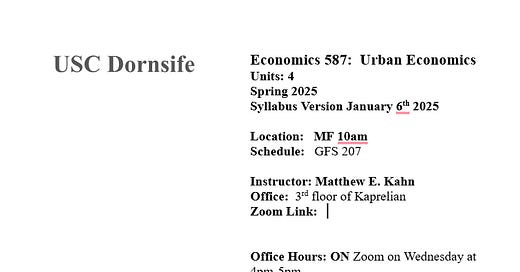A Sketch of My Urban Economics Final Exam Focused on the Effects of the Trump Tariffs
Can you answer these questions?
Early next month my 40 students in my urban economics class will take my final exam. I am now planning to use the Trump Tariff Shock to write 1/2 of the exam questions. Here is a rough sketch of what I may test on. Post your answers in the comments section!
Likely Final Exam Questions
#1 Over the last decades, Pittsburgh has lost more than 75,000 manufacturing jobs while many Southern states have experienced manufacturing job growth. Will the Trump Tariffs lead to a manufacturing revival in Rust Belt Cities such as Pittsburgh? Explicitly state your assumptions. Use the discrete choice model of firm locational choice and solve for the firm’s output and labor demand as a function of the tariffs.
#2 Suppose investors and firm CEOs believe that a Globalization Advocate will be elected President in 2028 such that tariffs will return to their 2024 baseline. Does this affect your answer to #1? Why?
#3 Many cities rely on tourism dollars as a source of services demand and tax revenue. How will the Trump Globalization policy (both tariffs and immigration restrictions) impact urban tourism? Suppose that the Trump Policies increase safety in cities, does this affect your answer?
#4 Many American cities are home to young men who are not working and many of them did not attend good urban public schools or study much while in school. If there is urban job growth in these cities caused by the Trump policies, will young men’s labor force participation rise in these cities? Does your answer depend on introducing educational reform in these cities? If “yes”, why.
#5 In recent decades, immigrants have moved to post-industrial cities such as Utica, New York. The durable housing stock continues to sit there and the low demand to live in such places has meant that housing is affordable there. If going forward, native population growth slows (the low fertility rate) and immigration slows down, what will be the path of home prices in medium sized cities such as Utica in the cold Northeast and Midwest? Who loses from this change in spatial asset prices?
#6 Some U.S cities feature industries that are complements of international supply chains while other U.S cities feature firms that are in direct competition with international firms. Discuss the industrial structure of both types of cities.
#7 Think of the daily life of suburbanites and urbanites in a metro area such as Houston. Which group of consumers/households will gain more (lose less) from the tariffs? In answering this question, focus on the urban economics ideas we discussed in class.
#8 There is considerable uncertainty about the impacts of the tariffs because there are many global products, and many different tariffs rates and the policies may change. Does this “policy uncertainty” benefit any cities or firms in these cities? If so, why?
#9. Suppose President Trump is correct that the tariffs will raise billions in $ of new revenue for the United States. Suppose that this revenue is recycled and given out disproportionately such that 70% goes to Republican States and 30% goes to Blue States and Blue Cities. What will be the spatial implications of this differential sharing of the revenue?





The assumption you make is that the current tariffs are an end state and not a negotiating ploy to get to zero tariffs. To avoid looking like you are in the midst of a full-blown TDS breakdown, add a question or two to ask what would happen if tariffs between trading partners went to zero; that is, what would Ricardo's Comparative Advantage Theory of International Trade hold?
Musk says he is advising the President to go to zero-zero tariffs, effectivly a US-EU free trade zone and, further, a US-EU free movement of people zone. What would a free trade and migration zone result in? Does free migration apply equally to Ricardo's Comparative Advantage Theory?
Thinking you know what Trump is thinking, if anything, has been extremely hazardous and likely to remain so. Student: State the risks of assuming a known when it is an unknown.